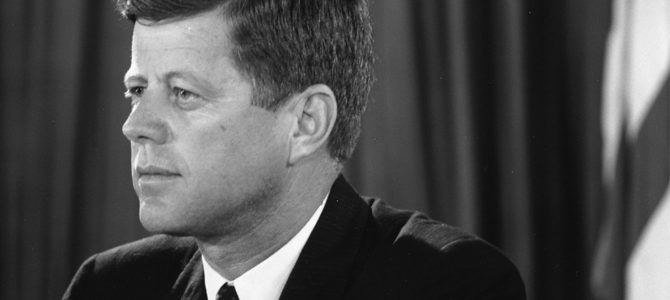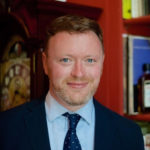
“The Catholic Church benefited enormously from the JFK presidency,” pollster Larry Sabato wrote Monday morning. “Prejudice against Catholics declined and millions were exposed to church rituals. Church leaders welcomed the ‘JFK effect.'”
“Now at last there is a second Catholic [president],” he continued, “and what do some in the hierarchy do? They ruin it.”
“A little more than 60 years [after President John F. Kennedy’s speech on accepting Catholics in American politics], a second Catholic president sits in the White House,” Washington Post columnist Karen Tumulty wrote Sunday, “and the church’s American bishops appear to have forgotten what it took for one of their own to get there.”
It’s a common take; I remember hearing it from my history teacher in high school. Often compared with then-Sen. Barack Obama’s 2007 speech on race relations in America, the basic Kennedy story says that his campaign speech on religious tolerance was a great step for Catholics in America, a death knell for the anti-Catholic bigotry then rampant in the country, and marked a new age for Catholic politicians in national politics. It’s a very nice story; too bad it isn’t true.
The problems with this civics fairy tale are it is completely ignorant of the real contents of the speech, is built on an elite view of Catholicism in politics, and is bankrupt of any serious religious-minded analysis. In short, as with so many things in American political education, it is a great secular myth.
In the speech, delivered to the Greater Houston Ministerial Association in front of hundreds of Protestant ministers, many of whom were deeply suspicious or openly hostile to a “Papist” in the White House, the young Massachusetts senator made a series of serious promises that would appease, or at least defuse, the anti-Catholics — at the great cost of crippling the moral authority of the Catholic Church in America for decades to come.
First, Kennedy promised that no man of God would advise — or even to seek to advise — his presidency, saying he believes “in an America… where no public official either requests or accepts instructions on public policy from the pope, the National Council of Churches, or any other ecclesiastical source.”
“I believe in an America where separation of church and state,” he declared, “is absolute.”
The power of the office, he insisted, must “not limited or conditioned by any religious oath, ritual or obligation.” America’s politicians, he loudly decreed, have nothing more to learn of sin and morality.
Second, he promised to continue his stands against American outreach to the Catholic Church and against Catholic education, calling federal aid to Catholic schools unconstitutional and asking the audience to, “judge me on the basis of my record of 14 years in Congress — on my declared stands against an ambassador to the Vatican, against unconstitutional aid to parochial [religious] schools, and against any boycott of the public schools.”
Third, Kennedy promised to disregard his Catholic faith “on birth control, divorce, censorship, gambling or any other subject,” declaring that “no power or threat of punishment could cause me to decide otherwise.” That’s no paraphrasing: “on birth control, divorce, censorship, gambling or any other subject” — “and no power or threat of punishment could cause me to decide otherwise.”
On Friday, California Rep. Ted Lieu publicly challenged the authority of the Catholic Church, writing to the U.S. Conference of Catholic Bishops that he is a Catholic politician who supports contraception, abortion, reproductive technologies, divorce, and gay marriage.
“Next time I go to church,” he threatened, “I dare you to deny me Communion.”
Catholic and non-Catholic observers alike gasped at Lieu’s open heresy. Few remembered that 61 years earlier, the man who would become America’s first Catholic president had taken virtually the same oath against his religion.
Kennedy’s speech was a major speech in American civic history and can absolutely be credited with going a long way toward ingratiating American Catholics into elite society. But as in the wake of Vatican II, when empowered modernist priests sought American affirmation by looting the gifts of the poor and stripping their churches of the architectural features and artistic treasures that made them uniquely Catholic, in exchange for political authority Kennedy stripped the Catholic Church of its moral authority.
Today, with the Catholic President Joe Biden and Catholic Speaker of the House Nancy Pelosi in power and using their power to attack the Hyde Amendment against federal funding of abortion, as well as the Mexico City policy against federal money for foreign abortion, that weakness is on full display.
Kennedy’s example also stands in harsh contrast with those American Catholic heroes who made great sacrifices for their country, and in doing so earned the admiration of their fellows, making great strides for the acceptance of the Catholic faith and faithful alike.
Men like Charles Carroll of Carrolton, known as “the first citizen,” who in addition to being the wealthiest and highest-educated man to sign the Declaration of Independence, was the only Catholic to do so — at a time his religion banned him from holding office in his home state of Maryland.
Men like Carroll’s cousin, John, who became a Jesuit at 18 and was ordained a priest 14 years later, who answered the call of the Continental Congress to try to enlist Catholic Quebec in the American Revolution, and later became the bishop of Baltimore, establishing both the first basilica of the United States and Georgetown University.
Men like John’s older brother, Daniel, who with Thomas Fitzsimmons are the only two Catholics to sign the U.S. Constitution.
Or men like Fr. William Corby, second founder of Notre Dame University, who in his Irish Brigade memoirs of the Civil War writes of the Protestant chaplains’ amazement at the daily religious observance and devotion of the Catholic soldiers.
When on the second day of Gettysburg the orders were given to prepare for imminent battle, Fr. Corby stood on a rock before the men and lifted his hand to grant the the rite of general absolution, earning the admiration and respect of all those present. Maj. Gen. St. Clair Mulholland wrote, “As he closed his address, every man, Catholic and non-Catholic, fell on his knees with his bowed down.”
The scene was more than impressive; it was awe-inspiring. Near by stood the brilliant throng of officers who had gathered to witness this very unusual occurrence, and while there was a profound silence in the ranks of the Second Corps, yet over the left, out by the peach orchard and Little Round Top, where [Brigadier Gens. Stephen] Weed and [Strong] Vincent and [1st Lt. Charles] Hazlitt were dying, the roar of the battle rose and swelled and re-echoed through the woods, making music more sublime than ever sounded through cathedral aisle. This act seemed to be in harmony with the surroundings. I do not think there was a man in the brigade who did not offer up a heart-felt prayer. For some, it was their last; they knelt there in their grave clothes. In less than half an hour many of them were numbered with the dead of July 2.
Or men like those who knelt in the brigade, who later erected a statue of Corby at the spot of the absolution and whose Catholic faith girded their storied bravery in battle — and won the hard-earned respect of even their most vicious detractors.
Far from the examples of these great Americans, Kennedy earned the acceptance of the American political establishment not by celebrating his faith and proudly wearing it in his role as the country’s first Catholic president, but by shedding it and promising all who would listen that neither the faith nor its bishops would have any bearing on his presidency.
In his 1960 speech, Kennedy dreamed of an America “where there is no Catholic vote,” and with the help of the bishops he helped achieve this. Thereafter there would be no sizeable Catholic vote. It splintered after the public endorsement of his secularism by most of the bishops.
“A little more than 60 years later, a second Catholic president sits in the White House,” Tumulty wrote in the Post, “and the church’s American bishops appear to have forgotten what it took for one of their own to get there.”
Or maybe they didn’t forget what it took to get there. And maybe as they consider the long-declining influence of God and morality in American public life, and the rising anti-Catholicism that has come with it, they’ll discard the secular myth of Kennedy’s speech and instead address their predecessors’ terrible mistake head on. Fortunately, they appear poised to do just that.
It wouldn’t be the first time. The church has been grievously wounded from both inside the church and from without it over and again in history, but by God’s grace, “the gates of Hell will not overpower it.”









